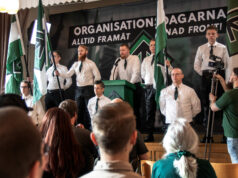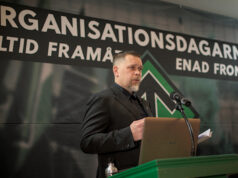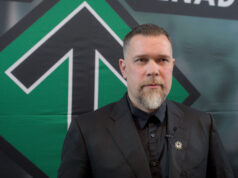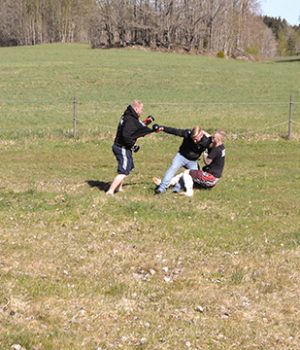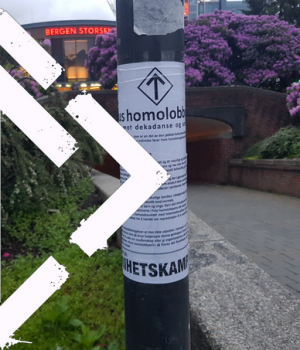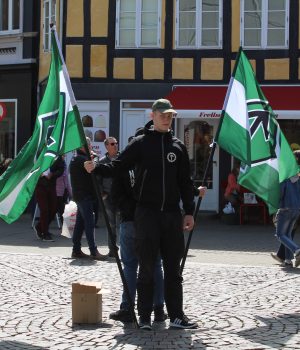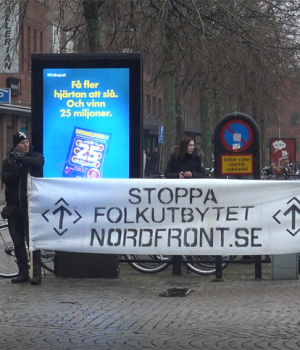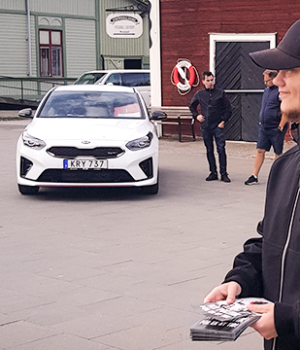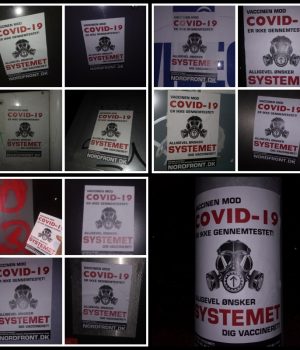IDEOLOGY. Martin Saxlind responds to the claim that the Nordic Resistance Movement is anti-democratic and therefore should be banned by the democratic state.
“The Nordic Resistance Movement is hostile to democracy and therefore should be banned by the state.” This is an argument that is usually expressed in newspapers and social media after some politically correct individual becomes offended and upset at seeing the Resistance Movement’s activists give out leaflets in their hometown. The argument is sometimes made by politically primitive amateur pundits and sometimes by lead editors and other professional commentators.
“You wouldn’t let us do this in your society, so you should not be allowed to do it in our society,” is a simple argument to understand regardless of one’s political level of education. That it isn’t especially well thought-out is another matter. For example, it can be noted that here our detractors do not claim to place themselves above us morally, but rather invoke the maxim of “an eye for an eye, a tooth for a tooth” – our enemies want to oppress us while simultaneously accusing us of being potential oppressors. This is clearly hypocrisy and a double moral standard. So from the outset we can establish that our enemies who seek to ban us are at least not morally superior to us.
“Democracy” does not exist
Furthermore, I believe it isn’t possible to be an “enemy to democracy”, as democracy is a concept with no definite meaning. There exists no general and uniform democracy that one can be for or against. Serious and nuanced standpoints can only be made in relation to a clearly specified phenomenon.
Below are a few examples that demonstrate how democracy can in principle mean anything at all:
* Both North Korea and the USA currently classify themselves as democracies.
* The cradle of democracy is said to be Ancient Greece, where neither women nor foreigners had the right to vote. This would hardly be viewed as democratic in today’s Nordic countries.
* Great Britain is regarded as the first parliamentary democracy, yet while the country was being ruled democratically, it was the world’s most imperialistic society. Both Britain and the USA claim to have spread democracy and civilisation via their former and contemporary imperialism. Meanwhile, anti-imperialist movements have cited democratic motives when resisting these states.
* Regarding race, democratically ruled states like the USA, Israel and South Africa have enforced laws upholding racial segregation. Conversely, according to some in the Nordics today, it is undemocratic to be against immigration.
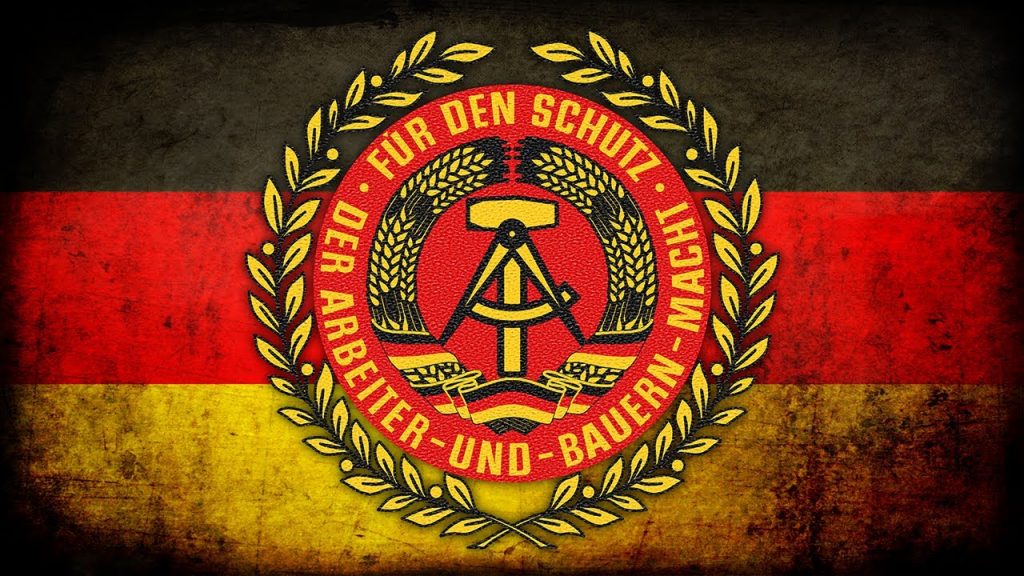
Clearly “democracy” is something highly changeable and flexible. Trying to force the Resistance Movement to take a position on such an indeterminable phenomenon is intellectually dishonest. It is simple populism, as our enemies know that most people in the Nordics are positive towards the notion of democracy and will therefore be sceptical of our organisation if we are portrayed as “anti-democratic”.
Democracy as nihilism
In reality, democracy is only one method of making decisions; it relates to a decision-making process, and the result of that process can, in principle, be anything at all. And the good democracy will always comply with the decision taken by the majority.
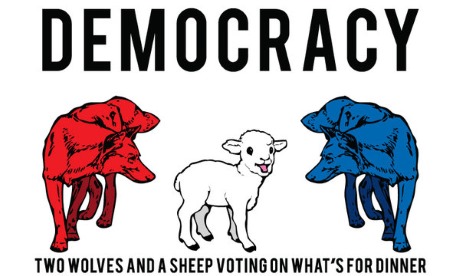
Because a majority can, theoretically – in complete accordance with democratic principles – oppress a minority, critics of democracy have often called it “the tyranny of the majority”. In order to stop majorities from oppressing minorities, states throughout history have introduced limitations on democracy. This has included enacting constitutions that defend individuals’ rights and prevent the democratically ruled state from violating these rights.
Personally I hold no religious belief in the democratic majority principle (that the majority’s view is always the best view). On the contrary, I think majorities have often been incorrect, and I believe it is problematic when no individual politician can be held fully responsible for a decision that has been taken collectively by a group.
Blindly accepting and believing in a detrimental policy just because it has the support of a majority of eligible voters is reprehensible. Such blind faith in democracy becomes a kind of nihilism, in which one accepts any and all negative consequences as long as a majority has taken the injurious decision. Right is quite simply right, and wrong is wrong, regardless of whether a majority claims wrong is right and right is wrong.
The Resistance Movement would thus be right to fight against matters such as mass immigration even if the majority of the Nordic people held a positive view of “multiculturalism”. It’s about what is right and wrong, not who has the most voters behind them.
A “democracy of values” threatens freedom of speech
In the Western world of today, Cultural Marxists have twisted the concept of democracy to be synonymous with their own values, meaning people who are politically incorrect can be branded as “undemocratic” despite the fact that a “real democracy” should tolerate all opinions.
One example of this is how it’s now considered a “democracy problem” that there isn’t total “equality” at workplaces, at home or in politics. Both genders, all ethnicities and all sexual orientations must not just have the same rights but must also achieve the same results everywhere. When reality says these groups are in fact unequal, the Left advocates coercive measures such as quotas to enforce an unnatural equality.
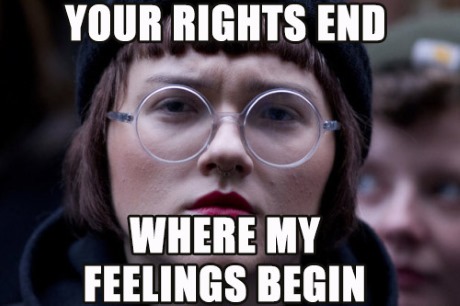
In the name of democracy, left-wing extremists hunt dissidents in the same way as the church once hunted heretics. If you have politically controversial views, you will not be allowed to be anonymous. You will be doxed, harassed, discriminated against in the job market, and if you are attacked by politically “right-thinking” terrorists, you will only have yourself to blame (as Fredrik Reinfeldt said during his time as prime minister about the Sweden Democrats, who were physically attacked because of their opinions).
Those dissidents who do not allow themselves to be cowed by the extreme Left and their allies in the established parties and liberal newspaper offices are instead often forced to fight against the entire state apparatus. Censorship laws like the “racial hatred” law in Sweden, and laws that forbid Holocaust revisionism in other countries, either silence or imprison people with the “wrong” opinions. The advocacy of out-and-out bans on political organisations like the Nordic Resistance Movement and Golden Dawn is another example of the suppression of free opinion that has spread throughout the Western world.
I reject this kind of “democracy of values”, as it is called in Sweden, not just because the underlying idea and practical execution are “undemocratic”, but chiefly because the Cultural Marxist values that have been exalted as non-negotiable norms are crazed and unhealthy. In my opinion, our society’s pursuit of sick politics is worse than the imposition of politics via undemocratic methods. All of those who genuinely cherish true democracy should hate the Left for its attempts to pervert the ideal of democracy. One cannot say that Sweden, for example, is a democracy with freedom of speech when it forbids controversial opinions from being expressed and bans political parties like the Nordic Resistance Movement.
In reality the term “democracy of values” is a wholly incorrect designation to describe this phenomenon. Rather we’re seeing a “dictatorship of values”, wherein the democratic element is nothing more than a strictly directed political stage play in which people and parties with the right values are permitted to compete for the nation’s support, while genuine dissidents are – via undemocratic means – oppressed and continuously prevented from taking part in the democratic process. For example, representatives from the Nordic Resistance Movement are never allowed to partake in live TV or radio debates to defend our organisation, meaning that, in the public sphere, our politics are always defined by our enemies.
Democracy and National Socialism
National Socialism has an ambivalent relationship to democracy. In Germany, the NSDAP succeeded in gaining power via democratic elections. After assuming office, Adolf Hitler engaged in an honest dialogue with the Germany people and explained that he needed a few years to solve the problems of unemployment and carry out other societal reforms, which is more than can be said for today’s democratic politicians, who continually promise the earth during election campaigns only to break all of their promises when they come to power, without any consequences whatsoever. The Third Reich also held referenda on important matters. As such, some National Socialists described the society as a Germanic democracy with elements of public governance.
It can furthermore be noted that the firearms legislation in the Third Reich was very liberal. The National Socialist state essentially wanted to have a strong and free people, just as the USA’s Founding Fathers did when approving the Second Amendment (the right to keep and bear arms) to the United States Constitution. This can be contrasted to today’s Sweden, where we have restrictive firearms laws on account of the state’s desire for an unfree and subdued people who cannot offer resistance to traitorous politicians.
The anti-democratic elements of the Third Reich must also be weighed against the historical context in which the society existed. At that time, Germany risked being subjected to a bloody Bolshevik revolution in the style of the “Russian” revolution (which should really be called “the Jewish revolution in Russia”). The act of restricting the communists’ political rights in Germany to save the German people from such a fate therefore ought to be considered reasonable.
At the same time, it became clear that World War I did not succeed in deciding the conflict between the major Western powers and that the new national boundaries after the war laid the foundation for new conflicts in Europe. In the east there was also the threat from the Soviet Union, which stood ready to go to war for the communist world revolution. Even thinkers like the German author Oswald Spengler, who was not entirely positive towards the NSDAP, predicted a second World War that would be more decisive and bloodier than the first. As such it was not peculiar that Germany and many other European states developed in a more totalitarian direction in the conflict-torn time before WWII. Democracies like Sweden, the USA and Great Britain also forbade oppositional groups during this period and put dissidents who threatened the established order in their respective countries in prison or concentration camps.
Under more peaceful conditions, a National Socialist society would be able to be considerably less hierarchical and autocratic. The essence of National Socialism is not a specific form of government or political programme that must be slavishly followed. The most fundamental aspect of National Socialism is racial consciousness – putting one’s own people first and creating a society in harmony with natural laws.

Nor is National Socialism an oligarchic movement that aims to install a dictatorial elite that profits from the people and keeps all other individuals and groups away from power. Such behaviour, on the other hand, is recognisable in both communist states and liberal democracies. National Socialism is positive to meritocracy and social mobility; i.e., that everyone, regardless of their economic background, is able to achieve their full potential in order to live as good a life as possible, as well as being as much use to society as possible. This also applies within politics and means that the National Socialist state would welcome political engagement by citizens if they wanted the best for society and had a talent for politics. The politicians would serve the people, not rule for their own personal benefit.
Political engagement does not necessarily need to happen by way of joining one of the several various competing political parties, as in today’s representative parliamentary democracy. Individual people could instead stand for local or national parliament and be popularly elected on their own personal merits. This would be more democratic than the current party rulership in Sweden, as today the individual voter can almost never have any influence over which politicians will represent him or her in places like the Riksdag. Today the electorate are forced to vote for one of the large established parties, who in turn have the right to decide which specific people will be “popularly elected”. With a more personal political engagement, politicians also become more personally responsible to their voters and can no longer hide behind a party label.
The political parties today function as an unnecessary filter between the people and politics. The parties are also organisations with their own economic interests that are difficult for the individual voter to keep tabs on. It would be much easier for voters to monitor individual politicians in a system where they are all required to be transparent in regard to their personal finances. If you take the parties out of the political equation, the politicians would also be more interested in compromising in order to achieve positive political results. Contrast this to politics today, where various political teams play a dirty game of intrigues, dishonest posturing and game-theoretic thinking in order for their own complex coalition to be able to win the next election.
In today’s multicultural and politically divided society, political censorship laws, widespread surveillance and powerful social oppression are all required to keep society together. As such, National Socialism’s critics believe that we National Socialists would require an even more repressive social order to force everyone living in the Nordics today to accept our politics. But this is not the case, as we, by stopping mass immigration and humanely repatriating those who do not belong here, would create an ethnically homogenous society permeated by a folk community. In our homogenous society, there would automatically be fewer differences and conflicts, and instead there would be a natural political unity growing organically from the people. In the National Socialist society, political objectives would be more self-evident and static than in today’s society, which is lacking in any shared higher goals; however, there would also be more scope for debates as to which paths and means best lead to our objectives.
Those interested in more detailed knowledge of how the Nordic Resistance Movement would like our society to function in the future can read Our Path. Those who haven’t read our party programme have no right to condemn us and claim we should be banned.
In conclusion, I will say here that National Socialism is neither for nor against democracy. National Socialism is a worldview that gives life purpose and meaning; today’s democracy (parliamentary democracy) is a political system which determines how political decisions ought to be made. National Socialism puts the purpose first (its own people’s well-being) and can, in striving towards that purpose, make use of certain elements of parliamentarianism and public governance.
This ambivalent and non-dogmatic approach to democracy is not unique to National Socialism. Many other worldviews, ideologies and religions have a similar relationship to democracy. Marxism, for example, has existed in both democratic and undemocratic forms, and Christianity has gone from ideologically supporting absolute monarchies to accepting the present democratic order.
Democracy and revolution
Historically speaking, modern democracy was introduced gradually via bloody revolutions against the old, monarchistic order. The democrats were radical and believed the changes for which they fought signified improvements and progress. Those who were against democratic reforms or revolutions were considered conservative and reactionary.
Today the opposite is true. In the West, an immense self-righteousness and conservatism has arisen in liberal democracy. Yesterday’s revolutionary zealots now say we have reached “the end of history” and that greater political changes are no longer desirable or even possible.
I regard this attitude to be absurd and historically baseless. All political systems can be improved, and today’s liberal democracy functions extremely poorly from many perspectives. Historically, liberal democracy has existed for a very short period of time, but even so this political system has already allowed serious problems like mass immigration and various environmental crises to arise. In less than 50 years, liberal democracy has succeeded in transforming Sweden from a relatively well-functioning and ethnically homogeneous welfare state into a multicultural dictatorship of values with open borders and general chaos.
It is claimed that freedom of speech still exists in Sweden and other liberal democracies, but the point of freedom of speech is not to be able to express popular opinions – real freedom of speech occurs when the system also tolerates controversial and unpopular views. Sweden’s freedom of speech has long since been restricted and severely threatened, but it’s still not illegal to voice “anti-democratic” opinions in our country.
Via democratic elections and resolutions in Sweden’s parliament, it is also possible to change our constitution and our form of government – for example in 2010 when a Riksdag majority, without any consultation whatsoever on the matter with the Swedish people, decided that Sweden must remain a multicultural society. Therefore, according to democracy’s own rules, it is permitted to advocate radical political changes and lawfully push through said changes if one wins sufficiently large support from the electorate. Conversely there is nothing that implies that “anti-democratic” opinions are criminal or automatically lead to criminality, and consequently politicians and other opinion-shapers should cease agitating for a ban of the Nordic Resistance Movement and other lawful organisations branded as “undemocratic”.
It is fair and reasonable to criticise Sweden’s form of government. If our liberal democracy did not tolerate criticism or welcome political improvements, it would in itself be totalitarian and undemocratic.
If one believes that the democracy of today really is the optimal societal system and something that a majority of people comprehend and are passionate about, he should not fear competition and criticism from movements that advocate a different society. Every country that bans the Nordic Resistance Movement or similar movements acknowledges they no longer believe in the superiority of liberal democracy.






